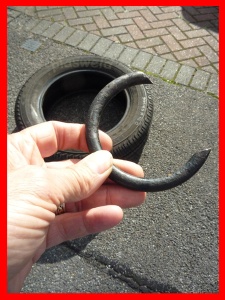 |
the track rod ends on these vehicles are handed
nearside and offside. |
Track
rod end or track control arm ball joints no matter what you call it,
it's at the end of the steering rack arms. For such a small ball
joint it takes a lot of abuse from us the driver hitting curbs,
bumping up them to park and potholes. It is surprising that they do
not fail more often. It is all these little knocks and bump over time
that led to them failing before they should. In most cases they are
not noticed until they fail the MOT, or the worst-case scenario give
up the ghost while we are driving down the road. I have been witnessing
to number of these over the years.
There
are some tell tail signs to alert us to their wearing out. Most of
them do not happen until they are quite loose in the ball joint
knuckle. Adverse wear on a tyre is one indicator. This looks like a
tracking problem; what sets it apart from tracking is that the tyre
looks more worn one side than the other. Another is an occasional
slight wobble on the steering when gently braking. Unless you are
very tuned in with your vehicle you will not notice it.
Once
the bad news is in that your transport failed the MOT it is not that
difficult a job to do. But I know there are a couple of 'buts' to
take into account, even so, they do not add that much drama to the
job.
Once
the wheel nuts are loosened jack the vehicle up and place an axle
stand under to support it just in case the jack fails. It does
happen. Take the wheel off and turn the steering so the steering arm
is fully extended this will allow fuller access to the ball joint.
The first thing to do is loosen the tack rod end locking nut on the
steering arm. These can be difficult to loosen, it is a good idea to
soak it in freeing oil. You will have to use a C spanner on this nut
so be careful as these spanners have a nasty habit of slipping off.
 |
| Shocking ball joint loose |
Now-a-days
most ball joints are held in place with a Ni-lock nut the thread
above the nut is most likely badly rusted. This is where an impact
wrench is handy as this bit of kit will have the nut undone in no
time. Again, soak in freeing oil. What happens is the nylon of the nut
locks solid on the rusty thread which then brakes the taper hold
allowing the whole thing to spin in place. Now the fun begins. If
this happens you will need the jack to push the ball joint back into
place. This will mean that you almost lift the van off the axle stand
to recreate the hold it had. This is one of the only ways of doing
it. Now you need a blow torch or nut heater so the nylon can be
melted, and the nut expanded. While it is red hot it is possible to
put a socket on it to complete the nuts removal. You will need to
work quickly as the heat dissipates from the nylon allowing it to
reform locking the nut again. Alternatively, you can if you have one
use a nut splitter.
If
the nut comes off as it should the ball joint now needs to be
separated from the hub arm. There are a couple of ways of doing this,
use a ball joint separation tool or jar it lose with a heavy hammer,
this method is not for the faint heated. It is my favoured way but
then I have had a lot of practice honing it down to a fine art. If
you decide to go this route, I suggest binding the handle where it
meets the head of the hammer with plastic tape the type electricians
use. You will need to wrap it around quite a few times. The reasoning
behind this is if you miss, which you will, the hub arm will strike
the hammers handle, the tape stops bits being taken out of the
handle lessening the chances of the head being broken off. You will
need to hit the arm with some force to get it to loosen and in most
cases several hits will be required to get it to shift.
Please
note: do not use the method described above unless you are
confident to do so. Getting it wrong may damage the van and yourself.
You have been warned.
 |
| wheel nut rotation of tightening |
Once
off, it is a good idea to count the number of turns it takes to
remove the track rod end from the steering rack.
With
the new track rod end in hand thread, it on to the arm the number of
turns it took to take it off. By doing this it should return the
tracking to what it was before you removed the old one. Lessening the
need to get the tracking adjusted straight away.
Put
the ball joint thread through the hub arm and tighten the nut to (37).
Re tighten the steering rack nut to the back of the ball joint, it is
a good idea to put a bit of copper grease on the thread to make it
easier to undo next time. Put the wheel on, thread the bolts on and
nip tight, drop the jack and tighten the wheel nut up to (140) in a
diagonal rotation. This makes sure that each bolt is evenly
tightened.
Please
note that the numbers in the brackets (00) are torque wrench settings
in Newton meters.






